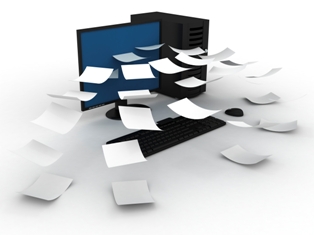The basis of document scanning is that it can provide your company with a way to get your paper files scanned. This includes records such as:
- Photos
- Newspapers
- Books
- Medical Records
- Etc.
Why use Document Scanning?
A company that hasn’t embraced document scanning is a company that is filled with large amounts of paper files. These files can take a lot of time to go through if you need something, especially in an emergency. Files that are missing, lost, damaged or misfiled lead to time wasted—which is money wasted searching for files.
Document scanning can save you the headache of an office full of paper files by transferring them all to a digital format of your choice that would be much easier to find. This allows you to save time searching for files as well as the ease of sharing a file with anyone in your office or with an employee who works remotely.
Advantages of Document Scanning
With document scanning you have the freedom of choosing the file format that you want for your files. This allows you to change your text documents to formats that can be read by Microsoft Word and Excel. Images can be converted to PDF or JPEG formats for ease of access as well. These files are then put on CDs or DVDs that can hold thousands upon thousands of files. It’s a bit cleaner than an office full of file cabinets.
This allows you to make your company’s filing system easy to search. Instead of hundreds or thousands of paper files to go through, someone can access the file by simply searching on a CD or a DVD. Even easier is the fact that all these files can be stored on a single server that anyone with a network connection inside your office can access. This will save you and your company an immense amount of time, which will save you money in the long run.
With this knowledge in mind, how can you say no to document scanning and getting rid of those archaic file cabinets and changing over to a digital storage system? Document scanning is the answer to organizing a cluttered office space and allowing for easier file location.





